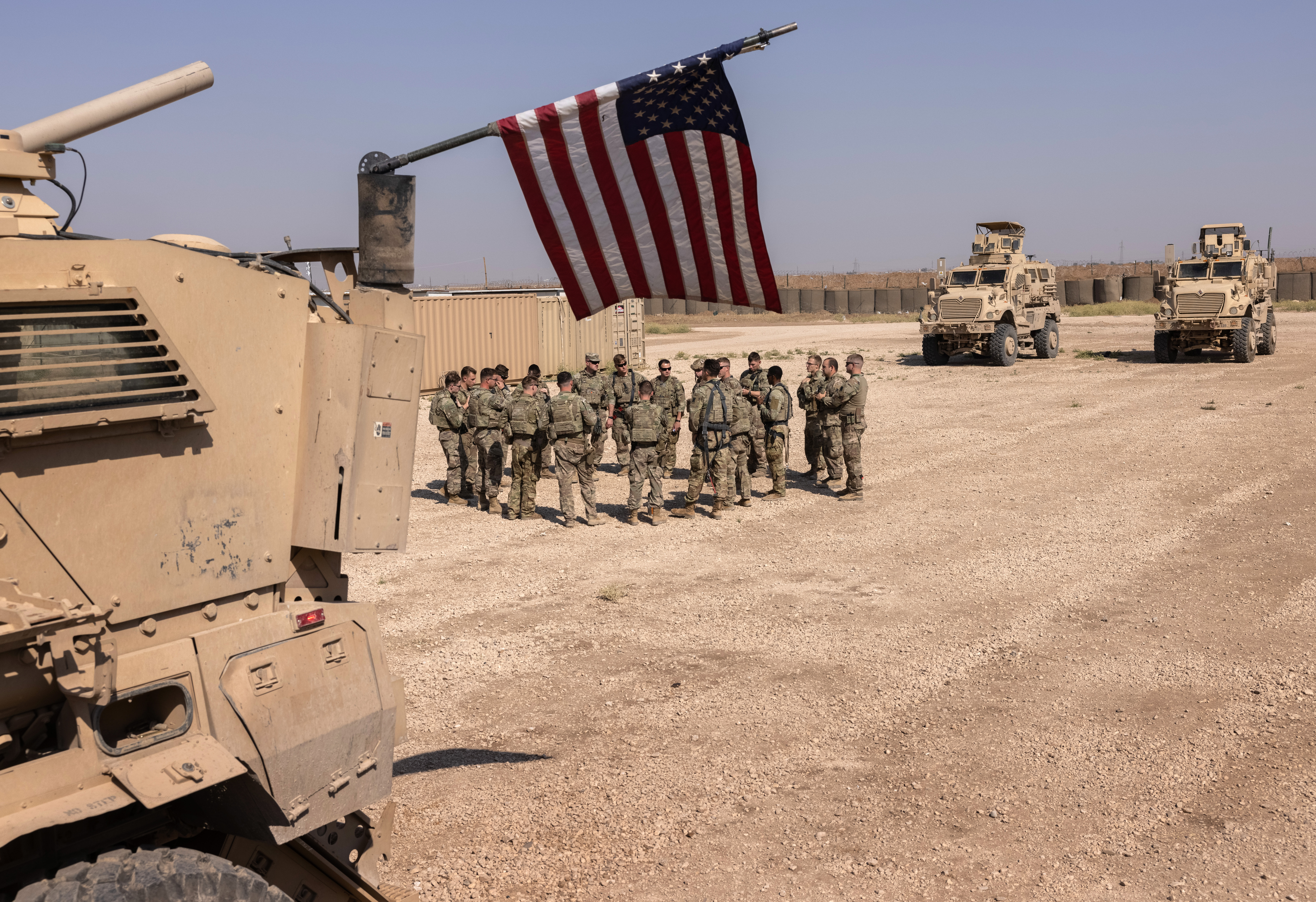
The U.S. military launched additional retaliatory strikes on Iran-backed forces in Syria on Thursday, in the latest back-and-forth with militants that American officials said were being directed by Iran’s Islamic Revolutionary Guard Corps.
In the latest skirmish, the militants planned to launch additional rockets on U.S. personnel, Defense Department officials said, but U.S. forces prevented the attack by striking the militants with AH-64 Apache attack helicopters, AC-130 gunships and M777 artillery. In total, the strikes this week killed four enemy fighters and destroyed seven enemy rocket launchers, according to a release from U.S. Central Command.
Iran-affiliated forces have recently stepped up low-level attacks on U.S. forces in Syria, including one incident on Aug. 15 when they launched rockets at the Green Village base near the Iraqi border.
The Biden administration responded to that attack with precision airstrikes in Deir ez-Zor, Syria, on Tuesday that targeted infrastructure facilities used by groups affiliated with the IRGC.
In retaliation, the militants launched rocket attacks on two separate sites in northeastern Syria that wounded three U.S. service members on Wednesday. At roughly 7:30 p.m. local time, rockets landed inside the perimeter of Mission Support Site Conoco, and a further barrage later landed in the vicinity of Mission Support Site Green Village, the military said.
One U.S. service member in Conoco was treated for a minor injury and returned to duty, while two others are under evaluation for minor injuries.
U.S. forces initially responded to the Wednesday strikes using attack helicopters, according to Central Command. The response destroyed three vehicles and equipment used to launch some of the rockets.
Congress has not authorized the use of military force in Syria, but U.S. troops have been in the country for several years and have often been targeted by Iran-backed militias. Those attacks have prompted counter-fire from the U.S. that lawmakers believe is consistent with President Joe Biden’s Article II constitutional authorities and doesn’t require explicit authorization.
Top Democrats have indicated so far that they support the latest effort. House Armed Services Chair Adam Smith (D-Wash.) called it a “self-defense operation” that shows the U.S. can respond swiftly to terrorism threats around the world. And Speaker Nancy Pelosi lauded Biden for what she said was “a necessary, proportionate measure to defend U.S. personnel.”
Similar retaliatory airstrikes have caused alarm on Capitol Hill over the past year, particularly among progressives who believe Congress should authorize the use of force overseas — even when the strikes are retaliatory. Lawmakers have tried for several years to repeal outdated war authorizations, to little avail.
“While I believe President Biden acted to protect American troops and citizens in line with his Article II authorities as Commander in Chief, this strike is yet another reminder that Congress should take more seriously its role and responsibilities in matters of war and conflict,” Sen. Tim Kaine (D-Va.) told POLITICO. Kaine has pushed for Congress to repeal the 1991 and 2002 authorizations for Iraq, and replace the open-ended 2001 authorization with a more narrow measure.
U.S. officials, meanwhile, said this week’s precision strikes were intended to send a message to Tehran that the U.S. will defend itself.
“We're not going to tolerate attacks by Iran-backed forces on our forces anywhere in the world to include in Syria, and we won't hesitate to protect ourselves and take additional measures as appropriate,” Colin Kahl, the Pentagon's undersecretary for policy, told reporters on Wednesday.
The U.S. military had scoped out 11 bunker targets at the site, Kahl said, but ended up targeting only nine of them because shortly before the strike, there was new evidence there might be individuals near the bunker. The forces held off on striking those targets “out of an abundance” of caution in order to avoid casualties, he said.
The IRGC is responsible for and directing the attacks, said one senior DoD official.
Though Kahl said the U.S. actions were not connected to the talks on restoring the Iran nuclear deal, the attacks come at a tricky time for the Biden administration, which is continuing to pursue negotiations with Tehran to restore the 2015 agreement former President Donald Trump abandoned.
Republican lawmakers said the skirmishes between U.S. forces and the Iran-backed militants in Syria show that Tehran can’t be trusted to follow through on its obligations as part of any diplomatic agreement.
“These attacks by Iran’s proxies against U.S. servicemembers show why we cannot cut a bad nuclear deal with Iran,” said Rep. Michael McCaul of Texas, the top Republican on the House Foreign Affairs Committee. “The Biden administration must walk away from this bad deal that will fuel Iran’s terrorist attacks on U.S. soldiers and citizens.”
“It’s usually sound policy not to negotiate with terrorist states who attack our soldiers and aren’t interested in being good actors,” added Rep. Michael Waltz (R-Fla.), a former Army Green Beret.







